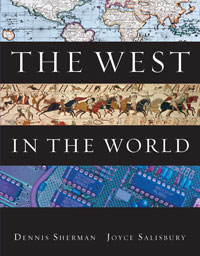1 A) the Krupp steelworks. B) the Bessemer processes. C) the railroad. D) electricity. 2 A) telegraph. B) telephone. C) automobile. D) railroad. 3 A) corporations. B) trusts or cartels. C) stocks. D) department stores. 4 A) joining professional associations. B) engaging in philanthropic activities, such as those against alcohol or prostitution. C) working in factories, for example as seamstresses. D) attending prominent European universities. 5 A) sports built character values needed in industry and the military. B) Greece should finally be welcomed into the community of nation-states. C) sporting events would generate enormous revenues for big business. D) classicism was back in style. 6 A) record moments of private life. B) doubt the value of retreating into the home. C) utilize servants in their homes. D) encourage women to work outside the home. 7 A) Victorian morality. B) bohemian. C) Freudian. D) old-fashioned. 8 A) alcoholism. B) the emergence of psychoanalysis. C) the increasing numbers of patients in insane asylums. D) impressionism. 9 Beagle , Charles Darwin made his most important discoveries leading to the theory of evolution inA) the Arctic region. B) South America and the Galapagos Islands. C) Africa. D) the Himalayas. 10 A) tried to apply it to all human behavior. B) argued that humans also evolved from a more primitive species. C) claimed evolution was incompatible with religion. D) asserted that selective breeding, or eugenics, could improve the human race. 11 A) the conditioned reflex. B) that the atom was made up of smaller particles. C) the Periodic Table. D) antiseptics. 12 A) the germ theory. B) a vaccine for the bacteria that caused tuberculosis and cholera. C) the thermometer. D) the X-ray. 13 A) employing the use of nurses during procedures. B) administering morphine to patients. C) using white surgical facemasks and rubber gloves. D) using antiseptics during operations. 14 A) romanticism. B) classicism. C) realism. D) impressionism. 15 A) A Doll's House .B) Middlemarch .C) The Old Curiosity S hop.D) Crime and Punishment .16 A) rejected modern urban life. B) tried to realistically portray the lower classes. C) embraced modern life. D) injected themes of pessimism and painful introspection into their works. 17 A) Max Plank. B) Albert Einstein. C) Ivan Pavlov. D) Robert Koch. 18 A) Henri Bergson. B) Friedrich Nietzsche. C) Sigmund Freud. D) Emile Durkheim. 19 A) through the efforts of gifted individuals who arose to leadership through superior strength, intelligence, and "the will to power." B) when all governing institutions were crafted according to true liberalism. C) when all nationalities had their own states. D) once all wealth was distributed equally. 20 A) The Doll House .B) The Rite of Spring .C) Swan Lake .D) The Scream .21 A) the Suez Canal B) the railroad C) the Panama Canal D) the automobile 22 A) Germany B) the United States C) Japan D) Britain





